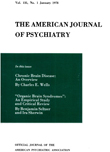A comparison of unipolar and bipolar depressive illness
Abstract
In a study of 40 consecutively hospitalized patients with research diagnoses of endogenous depression, the authors found no difference between unipolar and bipolar depressive patients in the risk for affective disorder in first-degree relatives, proportion of EEG or neuropsychological abnormalities, clinical evidence of the depressive syndrome, or response to doctor's choice of treatment. Bipolar patients had an earlier age of onset and displayed more manic symptoms that did unipolar patients. The authors conclude that the two forms of depressive illness are clinically and genetically homogeneous, are without identifying EEG or cognitive differences, and have an equally good response to somatic treatments.
Access content
To read the fulltext, please use one of the options below to sign in or purchase access.- Personal login
- Institutional Login
- Sign in via OpenAthens
- Register for access
-
Please login/register if you wish to pair your device and check access availability.
Not a subscriber?
PsychiatryOnline subscription options offer access to the DSM-5 library, books, journals, CME, and patient resources. This all-in-one virtual library provides psychiatrists and mental health professionals with key resources for diagnosis, treatment, research, and professional development.
Need more help? PsychiatryOnline Customer Service may be reached by emailing [email protected] or by calling 800-368-5777 (in the U.S.) or 703-907-7322 (outside the U.S.).



